
TRENDS IN IMMUNOLOGY
Scope & Guideline
Bridging Research and Practice in Immunology
Introduction
Aims and Scopes
- Immune Mechanisms and Pathways:
Exploration of the underlying mechanisms of immune responses, including cellular interactions, signaling pathways, and the role of various immune cells in health and disease. - Immunotherapy and Cancer:
Research on novel immunotherapeutic strategies, including the use of immune checkpoints, CAR T cells, and tumor microenvironment interactions to enhance cancer treatment outcomes. - Infectious Diseases and Immunity:
Studies investigating the immune response to infectious agents, including viral and bacterial pathogens, and how these interactions inform vaccine development and therapeutic interventions. - Autoimmunity and Inflammation:
Examination of the mechanisms driving autoimmune diseases and chronic inflammatory conditions, highlighting potential therapeutic targets and strategies. - Microbiome and Immunity:
Research into the interplay between the microbiome and the immune system, focusing on how microbial communities influence immune responses and contribute to health and disease. - Neuroimmunology:
Exploration of the connections between the nervous and immune systems, studying how immune responses influence neurological conditions and vice versa. - Translational Immunology:
Efforts to bridge laboratory findings with clinical applications, emphasizing studies that translate basic immunological research into novel diagnostics and treatments.
Trending and Emerging
- Immunometabolism:
A growing interest in the relationship between metabolism and immune function, exploring how metabolic pathways influence immune cell behavior and responses. - Cancer Immunotherapy Innovations:
A surge in research focused on novel cancer immunotherapy strategies, including the development of combination therapies, new checkpoint inhibitors, and personalized approaches. - Neuro-Immune Interactions:
Increased exploration of the interactions between the nervous system and immune responses, particularly concerning neuroinflammatory diseases and the effects of immune modulation on brain health. - Microbiome and Immune Regulation:
Emerging studies focusing on the role of the microbiome in modulating immune responses, highlighting its significance in health and disease management. - Regenerative Immunology:
Growing interest in the potential of immune cells in tissue repair and regeneration, particularly in the context of chronic diseases and aging. - Vaccine Technology Advancements:
Innovations in vaccine development, including mRNA technology and nanoparticle-based delivery systems, are becoming a central focus as researchers seek to improve efficacy and safety in immunization.
Declining or Waning
- Traditional Vaccine Approaches:
Research dedicated to conventional vaccine development strategies appears to be decreasing, as newer methodologies, such as mRNA vaccines and vector-based systems, gain prominence. - Basic Mechanisms of Immune Tolerance:
While understanding immune tolerance remains essential, the focus on its basic mechanisms has waned in favor of applied research exploring its therapeutic implications in autoimmune diseases and transplant rejection. - Single-Cell Analysis in Immune Research:
Although single-cell technologies have been groundbreaking, the initial surge of publications focusing solely on single-cell analysis seems to be stabilizing as more integrative approaches are being adopted. - Animal Models in Immunology:
There appears to be a shift away from classic animal models towards more sophisticated humanized models and organoid systems, which may explain the declining emphasis on traditional animal studies.
Similar Journals

JOURNAL OF INFECTIOUS DISEASES
Exploring the Dynamics of Infectious DiseasesThe JOURNAL OF INFECTIOUS DISEASES, published by OXFORD UNIV PRESS INC, is a leading peer-reviewed journal dedicated to advancing the understanding of infectious diseases through high-quality research. With an impressive impact factor reflecting its prominence in the field—ranking in the Q1 category for both Immunology and Allergy and Infectious Diseases—this journal serves as a pivotal platform for researchers, healthcare professionals, and students alike. Its extensive history, spanning over a century since its inception in 1904, highlights its established authority and commitment to the field. Based in the United Kingdom, the journal covers essential topics from clinical management to epidemiological trends, providing vital insights that inform practice and policy. Although the journal is not open access, it remains accessible to a wide audience, ensuring that critical research continues to drive innovation and best practices in infectious disease management.

GENES AND IMMUNITY
Empowering Research at the Intersection of Genetics and ImmunologyGENES AND IMMUNITY, published by SpringerNature, is a leading scholarly journal dedicated to advancing the field of genetics and immunology. With an impressive impact factor and a distinguished ranking in the Q1 quartile of both Genetics and Immunology disciplines for 2023, this journal serves as a pivotal platform for researchers and professionals looking to explore the intricate relationships between genetic factors and immune responses. Established in 1999 and continuously published until 2024, it features high-quality peer-reviewed research articles, reviews, and commentary that address critical issues and recent advancements in the field. The journal adheres to rigorous academic standards, evidenced by its strong Scopus rankings, making it a valuable resource for students, researchers, and practitioners alike who are seeking to deepen their understanding of genetics' role in immunity. For those looking to keep abreast of cutting-edge insights, GENES AND IMMUNITY is an essential read.

Immunity Inflammation and Disease
Exploring innovative insights in immunology and allergy.Immunity, Inflammation and Disease is a premier open-access journal published by WILEY, dedicated to advancing the field of immunology and allergy. Launched in 2013, this journal has established itself as a significant platform for researchers and professionals to disseminate high-quality research findings and innovative insights that address critical issues in immune responses and inflammatory diseases. With an impact factor that reflects its growing influence and a current ranking in Q3 for Immunology and Q2 for Immunology and Allergy, this journal serves a diverse audience keen on exploring cutting-edge developments. Researchers are encouraged to submit their work to share their findings with a global reach, foster collaboration, and enhance the understanding of immune mechanisms and therapeutic strategies. Accessible since its inception, Immunity, Inflammation and Disease is committed to open science, ensuring that vital research is freely available for the advancement of knowledge within the academic community and beyond.
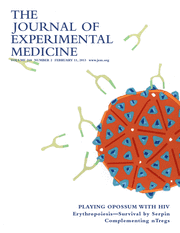
JOURNAL OF EXPERIMENTAL MEDICINE
Leading the Charge in Biomedical InnovationJOURNAL OF EXPERIMENTAL MEDICINE, published by Rockefeller University Press, is a renowned peer-reviewed journal dedicated to advancing the field of experimental medicine since its inception in 1896. With an impressive impact factor and categorized in the Q1 quartile for Immunology, Immunology and Allergy, and Miscellaneous Medicine, this journal stands at the forefront of medical research and innovation. It provides a prestigious platform for scholars and practitioners to disseminate groundbreaking findings that drive the understanding of disease mechanisms and therapeutic strategies. While the journal is not open access, it maintains high visibility and engagement within the scientific community, fostering collaboration among researchers, professionals, and students alike. The journal's consistent ranking in the top percentiles of Scopus illustrates its significant impact and commitment to excellence in medical research.
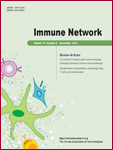
Immune Network
Unraveling Complexities of the Immune SystemImmune Network is a prestigious journal dedicated to disseminating high-quality research in the field of immunology, infectious diseases, and allergy, under the esteemed KOREA ASSOCIATION OF IMMUNOLOGISTS. Founded in 2016, this journal has quickly ascended to a top-tier publication, achieving Q1 rankings in 2023 in multiple relevant categories, including Immunology, Allergy, and Infectious Diseases. With a strong emphasis on innovation and interdisciplinary research, Immune Network appeals to a diverse audience of researchers, professionals, and students keen on advancing the understanding of immune responses and disease mechanisms. However, it is crucial to note that the journal operates under a subscription model without open-access provisions. Its impact factor further solidifies its reputation, reflecting the significant influence of the articles published. Located in South Korea, the journal serves as a global platform for sharing revolutionary insights and fostering collaborations within the immunology community.
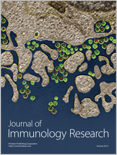
Journal of Immunology Research
Discovering Immunity: A Global Platform for Innovative ResearchJournal of Immunology Research, published by HINDAWI LTD, stands as a pivotal open-access journal in the realm of immunology, with a particular emphasis on advancing knowledge in both fundamental and applied aspects of the field. Since its inception in 1990, the journal has committed to the dissemination of high-quality research, earning a respectable impact factor that reflects its significance. Based in Egypt, it provides a platform for researchers from around the world, showcasing innovative studies and reviews that contribute to the understanding of immune system mechanisms. Its 2023 rankings place it in the Q2 category for Immunology and Allergy, and Q1 in the broader category of Medicine (miscellaneous), indicating a strong reputation among its peers. Through its open-access model, the journal promotes wide accessibility of cutting-edge research, catering to researchers, professionals, and students alike. With ambitions that converge through 2024, the Journal of Immunology Research continues to be an essential resource for those seeking to explore the forefront of immunological science.
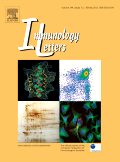
IMMUNOLOGY LETTERS
Advancing Immunological Insights for Global ImpactIMMUOLOGY LETTERS, published by Elsevier, is a distinguished journal in the field of immunology, focusing on the latest advancements and findings that significantly influence immunological research and clinical applications. Established in 1979, the journal has evolved to cater to a global readership, featuring high-quality peer-reviewed articles across a diverse spectrum of topics related to immunity and allergic responses. With an impressive Q2 category ranking in both Immunology and Allergy as of 2023, it holds a strong position within the scientific community, evidenced by its commendable Scopus rankings (Rank #71/233 in Medicine - Immunology and Allergy and Rank #85/236 in Immunology and Microbiology - Immunology). While primarily subscription-based, the journal aims to foster knowledge dissemination that encourages collaboration among researchers and practitioners alike, making significant contributions to the understanding of immune mechanisms. The journal is integral for educators, students, and professionals aiming to stay abreast of current trends and breakthroughs in the immune system's intricate functions.

CELLULAR IMMUNOLOGY
Illuminating the Pathways of Immune MechanismsCELLULAR IMMUNOLOGY is a prestigious journal published by Academic Press Inc. Elsevier Science, dedicated to advancing the field of immunology. Established in 1970 and converging ongoing research up to 2024, this journal has carved out a significant niche within the academic community, boasting a notable Q2 ranking in the Immunology category and holding a respectable 67th percentile ranking within Scopus for its contributions to the disciplines of Immunology and Microbiology. The journal serves as a vital platform for disseminating high-quality research, reviews, and methodologies that elucidate the intricacies of cellular immune responses, thereby benefiting researchers, professionals, and students alike. Although it does not offer open access, the journal's impact is evidenced by its comprehensive coverage of pioneering studies and ongoing developments in the immunological sciences, positioning it as an essential resource for those seeking to deepen their understanding and engage with the latest findings in cellular immunology.

INFECTION AND IMMUNITY
Empowering Researchers with Cutting-Edge DiscoveriesINFECTION AND IMMUNITY is a distinguished peer-reviewed journal published by the American Society for Microbiology, focusing on groundbreaking research in the fields of infection, immunology, microbiology, and parasitology. Established in 1971, this journal has built a robust legacy, converging years of scientific discovery with a vision towards 2024 and beyond. With an impressive Impact Factor, the journal holds significant rankings in various categories; its Q1 status in both Infectious Diseases and Parasitology underscores its high relevance and quality within the scientific community. Researchers and professionals alike will benefit from its content, as it promotes the latest advances in understanding immune responses and infectious agents, further legitimizing its place among the top quartiles of its respective fields. Access options are provided through traditional subscription models, ensuring a broad charitable dissemination of knowledge. As a pivotal resource for scholars and practitioners alike, INFECTION AND IMMUNITY stands at the forefront of microbiological and immunological research, fostering essential discourse that is crucial for advancing public health and scientific insight.
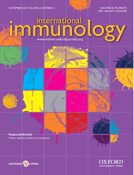
INTERNATIONAL IMMUNOLOGY
Leading the Charge in Immunological Discoveries and Developments.INTERNATIONAL IMMUNOLOGY, published by OXFORD UNIV PRESS, stands out as a premier journal in the field of immunology, providing a vital platform for disseminating groundbreaking research and innovative developments within the discipline. With an impressive Q1 ranking in Immunology and Allergy, as well as in Medicine (miscellaneous), it consistently showcases high-impact studies that contribute to the advancement of immunological knowledge. The journal spans over three decades, from its inception in 1989 to its ongoing contributions as of 2024, thus solidifying its reputation in the scientific community. Researchers, professionals, and students will find valuable articles that delve into the complexities of immune responses, therapeutic interventions, and emerging immunological paradigms, ensuring INTERNATIONAL IMMUNOLOGY remains at the forefront of knowledge in the life sciences.